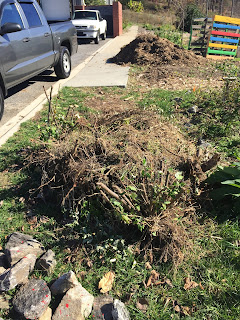The last few weeks in the Castanea garden have been a little different than normal. We did our usual routine of picking weeds but two weeks ago we had to tackle a big problem. A very invasive plant had been grown in the garden on accident a few years ago and it had spread all over the garden, so we had to take it out. We started by digging around the plants and locating the roots. Once we found the roots, we took a pickaxe and broke the roots. Then came the hard part. We had to get down in the hole we dug and pull the plant out of the ground. The plant we pulled out is the big one in the bottom right corner of the picture of all the weeds. After this, we headed behind the garden to a greenhouse. A few years ago, the greenhouse was functioning but because of a problem with the plastic on the outside, it fell apart. This year, the garden coordinator is trying to make the greenhouse functioning again so we went to go paint it.
These past few weeks in the garden have been interesting because they have showed me that gardening is a lot more than just planting fruits and vegetables and harvesting them. I learned that you have to do a lot to keep a garden tidy and functioning and I probably wouldn't have really thought about it if I didn't do it. These past weeks have also taught me a bit about working in a community. I had honestly never really given much thought to who does things like paint buildings or pull weeds. I think that working in the Castanea garden has possibly made me a bit more thoughtful about my community and overall, I'm very happy I did it.
Thursday, November 12, 2015
Wednesday, November 4, 2015
Ron Finley TED talk and Biotechnology Isn't Saving The World
I thought Ron Finley had a great TED talk. Finley made his TED talk very entertaining but also informative. I think what he is doing is great. In this growing world, space for living is starting to become a problem, but Finley proves these claims wrong. Finley's idea of utilizing extra city space is genius and I think it's a method of gardening that should be reproduced in more cities in America.
In the reading "Biotechnology Isn't Saving the World", I think the author had some similar points to Finley. Lappé brings up points about eating healthy in today's world and also talks about healthy food deserts. One of the differences between Lappé and Finley's discussion is that Lappé focuses more on politics saying that democracy is the key to solving world hunger as opposed to biotechnology.
In the reading "Biotechnology Isn't Saving the World", I think the author had some similar points to Finley. Lappé brings up points about eating healthy in today's world and also talks about healthy food deserts. One of the differences between Lappé and Finley's discussion is that Lappé focuses more on politics saying that democracy is the key to solving world hunger as opposed to biotechnology.
Monday, November 2, 2015
The Omnivore's Delusion and Real Food, Real Farming Reading Response
I agree with Pollan that corn is to blame for a lot of America's health problems. I hadn't thought about it until now, but I've realized that most of the cheap food we consume these days contains corn or corn syrup or is fed corn. I never really saw corn as "unhealthy" but I guess it's just the way that Americans use corn that is unhealthy. I have to disagree with Hurst's argument that using corn is ok because thats what farmers have been using for years. Just because something is a tradition doesn't mean it's a good thing, especially if that tradition is one of the suspects for the obesity epidemic.
Even though I didn't completely agree with all of Hurst's ideas, I enjoyed reading his article, The Omnivore's Delusion: Against the Agri-intellectuals. I thought his rhetoric was a good blend of informational and humorous. For example, in the first paragraph when he says, "He's talking about food, damning farming, particularly livestock farming, compensating for his lack of knowledge with volume" (Hurst, 204)
Even though I didn't completely agree with all of Hurst's ideas, I enjoyed reading his article, The Omnivore's Delusion: Against the Agri-intellectuals. I thought his rhetoric was a good blend of informational and humorous. For example, in the first paragraph when he says, "He's talking about food, damning farming, particularly livestock farming, compensating for his lack of knowledge with volume" (Hurst, 204)
Subscribe to:
Comments (Atom)

